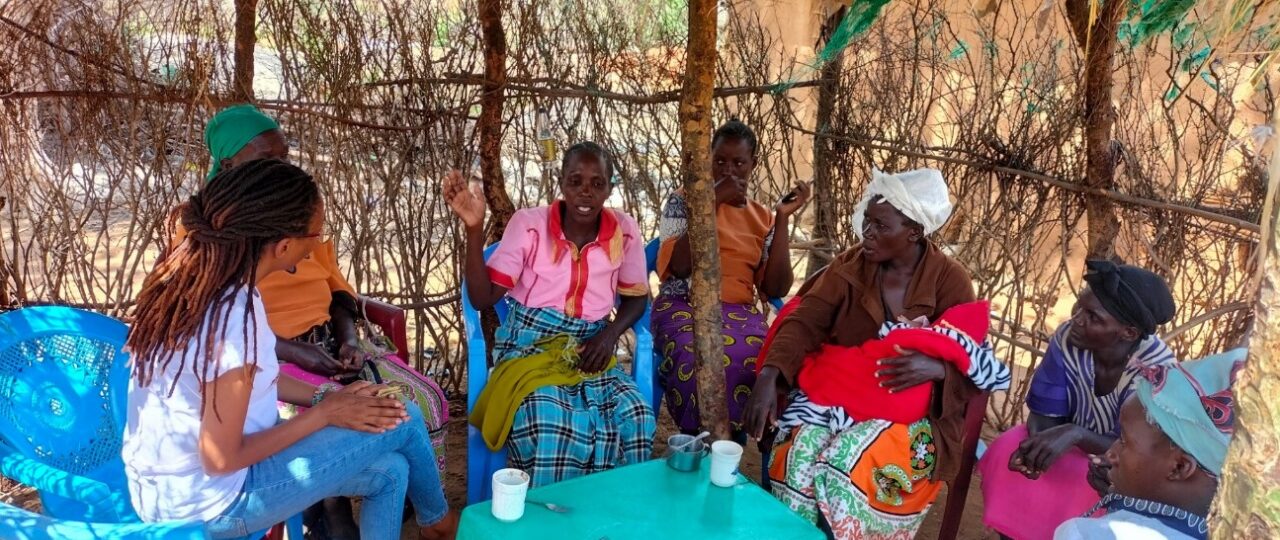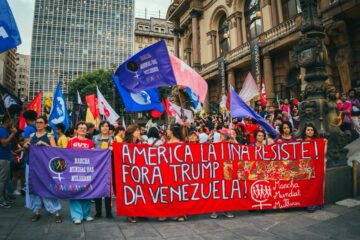I want to look at the topics of women lives and environmental injustice from a climate change perspective. And I would like to tell a story from the community where I come from, called Akamba, in Kitui County. The community borders another county by the name Tana River. Since I was born, the two communities have had conflicts, especially from a perspective of herder-farmer conflicts, where the people from Tana River keep animals, especially camels, and the people from Kitui County are farmers. It never used to be deadly, but, over time, the conflict has become worse because of the effect of climate change.
We’ve seen people being displaced, especially in the Akamba community, and having to sleep in the forest because they cannot sleep in their homes for fear of being attacked by the people from Tana River community. When they bring their camels to feed in the forest in Kitui County, they also feed on the farms, so the camels eat Akamba’s food in the farm. If a member of the community from Akamba tries to prevent the camels from eating the food in the farm, they would be attacked by the people from the other region. There have been killings all over. In the process, people have been displaced, especially women. The men would remain behind, taking care of the homes, but the women and the children would be taken to the forest. The argument is that they cannot run quickly when the attackers come home.
Staying in the forest, women are getting firewood and gum from the forest to sell, but they have been raped by the other community. And, while they are in the forest, education of young girls and boys is not going on. Teenage pregnancies have also gone up. So the impact is more on the female gender than the male gender, looking at it from a gender perspective. That is one way how climate change has affected women in Kenya.
Other one is from a dumpsite in Nairobi called Dandora, the biggest one in East Africa. It was ordered to be closed in 2021 by the Land and Environmental Court in Kenya, because of the harm it is causing to its citizens. But that has not happened. Women are not getting their monthly periods as they used to. Issues of cancer, issues of pregnancies, people losing their pregnancies have been reported. All this is the impact of an environment that has been polluted and exploited by the industries that are invested in our country.
How are women trying to overcome and adapt in this environment that does not serve them? I grew up with my maternal grandmother having a good relationship with the forest and with the mountains. She used to speak to the forest with a group of women, and it used to listen. These women would go on top of the mountains and call out for rain. And it would rain. Why? Because they had a good relationship with the forest, with the rain, with the mountains. They never used to exploit the forest. They preserved it.
There are other innovations that the Kenyan women are involved in terms of preserving the environment and environmental justice. Some of you may know the Professor Wangarĩ Maathai. She was awarded the Peace Award because of her work in Kenya and globally. She said: “I know there is pain when sawmills close and people lose jobs. But we have to make a choice. We need water and we need these forests.” That’s a comment referring to the economic hardships that Kenyans were going through. She was also encouraging some Kenyans that, as much as we need benefit from these forests and from the environment, we also have a responsibility of taking care of the forest. She started the Green Belt Movement where she brought women from different counties in Kenya. These women started planting trees, promoting environmental conservation. That restoration initiative is still active to date.
Kenyan women are promoting climate and environmental justice. We’ve seen women right now planting indigenous trees that we grew up eating fruits from. Indigenous trees where we sat under their shade. I remember when I was growing up, we were taking care of animals in the forest, and we never used to come back home to eat lunch because we ate forest berries for lunch. There were fruits. We would just walk around, get fruits in the forest, and that was our lunch. Indigenous trees also provide you with medicine. When I got a cough, my grandmother would just peel some part of an indigenous tree and make some potion to heal me.
The forest restoration is aiming to get back to where we used to be. The women are also managing water by having different ways of water harvesting. We also have sustainable agriculture, which is being practiced, especially in Kenya, by World March of Women members in Nyandarua County and Muranga County. In Muranga County, we have seen women planting dry roots, arrow roots, which do well in dry areas. We’ve seen women planting that for their own consumption and then later on adding value and selling to the market.
Finally, we have seen knowledge sharing. Older women are sharing with younger women on how to relate with the forest, with the land, with the waters, with the nature that is around us. Such dialogues and circles are building a community of women that are preserving the environment.
My closing remarks are coming from some quotes made by women in the struggle for environmental justice. Susan Griffin says that “we are the bird’s eggs. Bird’s eggs, flowers, butterflies, rabbits, cows, sheep; we are caterpillars; we are leaves of ivy and sprigs of wallflower. We are women. We rise from the wave. We are gazelle and doe, elephant and whale, lilies and roses and peach, we are air, we are flame, we are oyster and pearl, we are girls. We are woman and nature.” This quote encourages me and I hope it encourages you to know that we have a relationship with nature, and we need to restore and preserve it so that it can also serve us. The last quote that I came across is from Chief Si’ahl and it really speaks to me: “the Earth does not belong to us, we belong to the Earth.”
Regina Mutiru is a member of the World March of Women in Kenya. This article is an edited transcript of her presentation at the webinar “Building Proposals for Feminist Economy and Environmental Justice,” organized by Friends of the Earth International, World March of Women, Capire, and Real World Radio on July 15, 2025.




